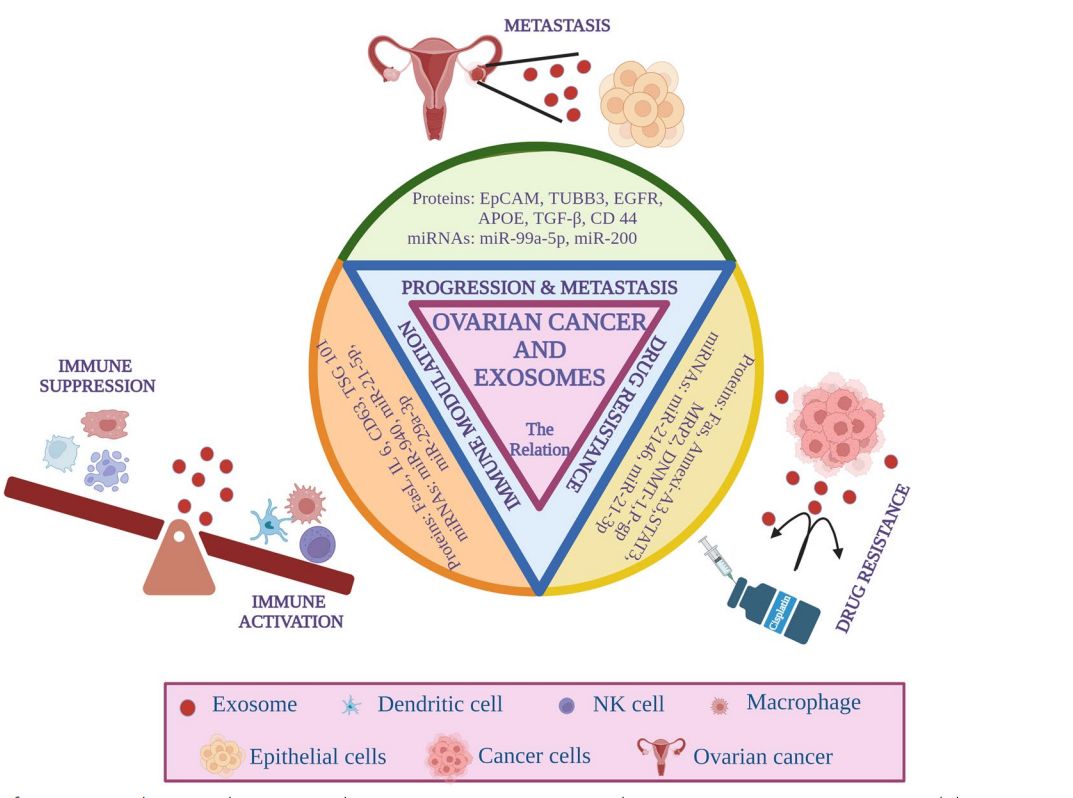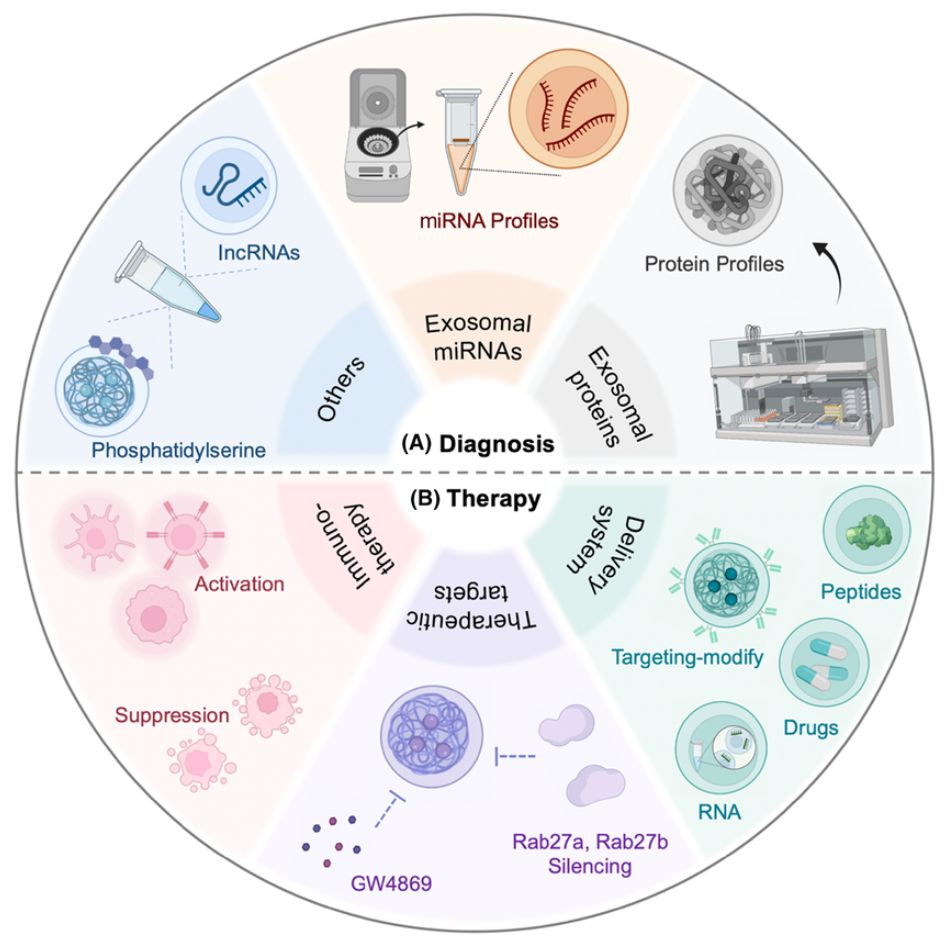Exosome Research in Human Ovarian Cancer
As signal carriers, exosomes are involved in the development of many diseases. The differential of specific components in tumors and the characteristics of easy to obtain, less invasive, not easy to degrade, and strong targeting have attracted much attention to exosomes in tumor therapy.
Current studies confirm that exosomes play an important regulatory role in the process of ovarian cancer (OvCa) progression, metastasis, and invasion. The application of exosomes as a diagnostic and prognostic tool and therapeutic method for OvCa has great potential.
Role of Exosomes in OvCa Progression
Several studies have confirmed that exosomes secreted by cancer cells can reprogram normal cells and play an important role in OvCa metastasis. Exosomes from primary OvCa cells can stimulate metastatic invasion by remodeling the TME through intercellular transmission between normal stromal cells and cancer cells, immune cells, and cancer-associated fibroblasts (CAF). In addition, cancer cell-derived exosomes support cancer progression by helping cells evade the immune system in a variety of ways. Recently, exosomes have been identified as a key factor in the development of drug resistance in several malignant tumors, including OvCa.
 Figure 1. Exosomes optimize OvCa progression, metastasis, immunosuppression, and drug resistance. (Bhavsar D, et al., 2024)
Figure 1. Exosomes optimize OvCa progression, metastasis, immunosuppression, and drug resistance. (Bhavsar D, et al., 2024)
Significance of Exosomes for Treatment of OvCa
OvCa is one of the deadliest gynecological malignancies in women. At present, most patients with OvCa are already in advanced stage when clinically diagnosed. Treatment includes surgery, chemotherapy, and radiotherapy, but OvCa is prone to recurrence, and about 2/3 of advanced patients eventually die of recurrence resistance. Therefore, its early diagnosis and targeted therapy are difficult and hot spots in clinical research. Currently, exosomes are believed to play a role in directly recognizing signaling molecules on the surface of target cells and transferring information between cells by binding with receptors. In recent years, scholars have been exploring the biological functions of exosomes and their clinical applications, and the understanding of exosomes has gradually become deeper and more comprehensive. Studies have shown that the clinical diagnosis and treatment of exosomes in OvCa face great challenges, but contain great application prospects.
 Figure 2. Potential clinical applications of exosomes in OvCa. (Chen Q, et al., 2023)
Figure 2. Potential clinical applications of exosomes in OvCa. (Chen Q, et al., 2023)
Exosomes in the Diagnosis of OvCa
It has been found that the exosomes of OvCa patients differed significantly from those of the normal population in terms of number and protein content. Proteomic analysis of plasma exosomes from OvCa patients revealed significant differential expression of FGG, GSN, FGA, and LBP. With the further development of diagnostic technology, researchers utilized ExoProfle microarrays to discover biomarkers with diagnostic capability for OvCa, including HER2, EpCAM, EGFR, CD24, etc. In addition, the researchers used microfluidic methods to discover three exosomal tumor markers in the plasma of OvCa patients and also confirmed the accuracy of OvCa diagnosis by combining the expression of CA-125, EpCAM, and CD24 through ExoSearch technology. The study found that serum miR-99a-5p levels are higher in OvCa patients, suggesting that miR-99a-5p can be used as a potential marker for early diagnosis of OvCa.
Exosomes in the Prognostic Evaluation of OvCa
Exosomes not only have early diagnostic value but also show certain advantages in the prognostic assessment of OvCa. Researchers found that the concentrations of four exosomal miRNAs (miR-200a, miR-200b, miR-373, and miR-200c) in the plasma of OvCa patients are higher than those of control subjects and that the elevated expression levels of miR-200c and miR-200b could be used as a potential marker for assessing the prognosis of OvCa. In addition, researchers found that serum exosome MALAT1 expression levels are significantly elevated in patients with epithelial OvCa, which is associated with advanced metastatic epithelial OvCa phenotype and poor prognosis.
Exosomes in OvCa Therapy
- Exosomes as Therapeutic Targets of OvCa
It is currently believed that exosomes have potential applications in OvCa treatment, including in OvCa anti-chemotherapy resistance, tumor metastasis, target therapy, and improvement of clinical efficacy. It has been found that exosomes in hypoxic OvCa cell lines could promote OvCa metastasis and improve chemotherapy resistance, and could be used as a new mechanism for tumor metastasis, chemotherapy resistance, and an intervention to improve clinical efficacy.
- Exosomes as Drug Carriers for OvCa Treatment
Exosomes have a stable bilayer lipid membrane structure, which makes them highly tolerable in the internal circulation and can carry a variety of drug molecules and genes (e.g., proteins, lipids, ribonucleic acid, and deoxyribonucleic acid) to penetrate the tissues, so exosomes are expected to become a new type of effective drug delivery system. It has been found that exosomes of adipose mesenchymal stem cells can reduce OvCa cell proliferation and promote apoptosis by delivering miRNA. The delivery of anthocyanin through exosomes acted on OvCa cells and had strong therapeutic effects on both drug-sensitive and drug-resistant OvCa cells. In addition, exosomes loaded with tripterygium wilfordii can inhibit OvCa cell proliferation as well as tumor growth, which has a better tumor therapeutic potential. The above findings suggest that therapeutic exosomes can be applied to inhibit OvCa cell proliferation. Although clinical application still faces many challenges, engineered exosomes remain a promising therapeutic strategy for the treatment of OvCa.
Our OvCa-derived exosome products:
| Cat No. | Product Name | Source |
| Exo-HDBF-23 | HQExo™ Exosome-SDH-Single Donor Uterine Cancer Plasma exosome | Exosome derived from Single Donor Uterine Cancer Plasma |
| Explore All Exosomes Isolated from Human Ovarian Cancer Plasma | ||
Summary
The discovery and in-depth study of exosomes have played an important role in the diagnosis and treatment of OvCa, and their unique biological advantages provide new ideas for early diagnosis, prognostic assessment, targeted drug loading, and improved efficacy of OvCa.
As a pioneering biology company, Creative Biostructure is committed to addressing the key challenges that hinder the clinical application of exosomes. Our advanced exosome isolation and characterization technologies ensure reliable and consistent isolation of OvCa-derived exosomes. In addition, we provide optimal dosing regimens and explore the most effective routes and frequencies of administration to maximize the efficacy of exosomes.
Feel free to contact us for groundbreaking exosome-based solutions that will revolutionize the early detection and personalized treatment of OvCa.
References
- Bhavsar D, et al. Exosomes in diagnostic and therapeutic applications of OvCa. J Ovarian Res. 2024. 17(1): 113.
- Chen Q, et al. The diagnostic and therapeutic prospects of exosomes in OvCa. BJOG. 2023. 130(9): 999-1006.
